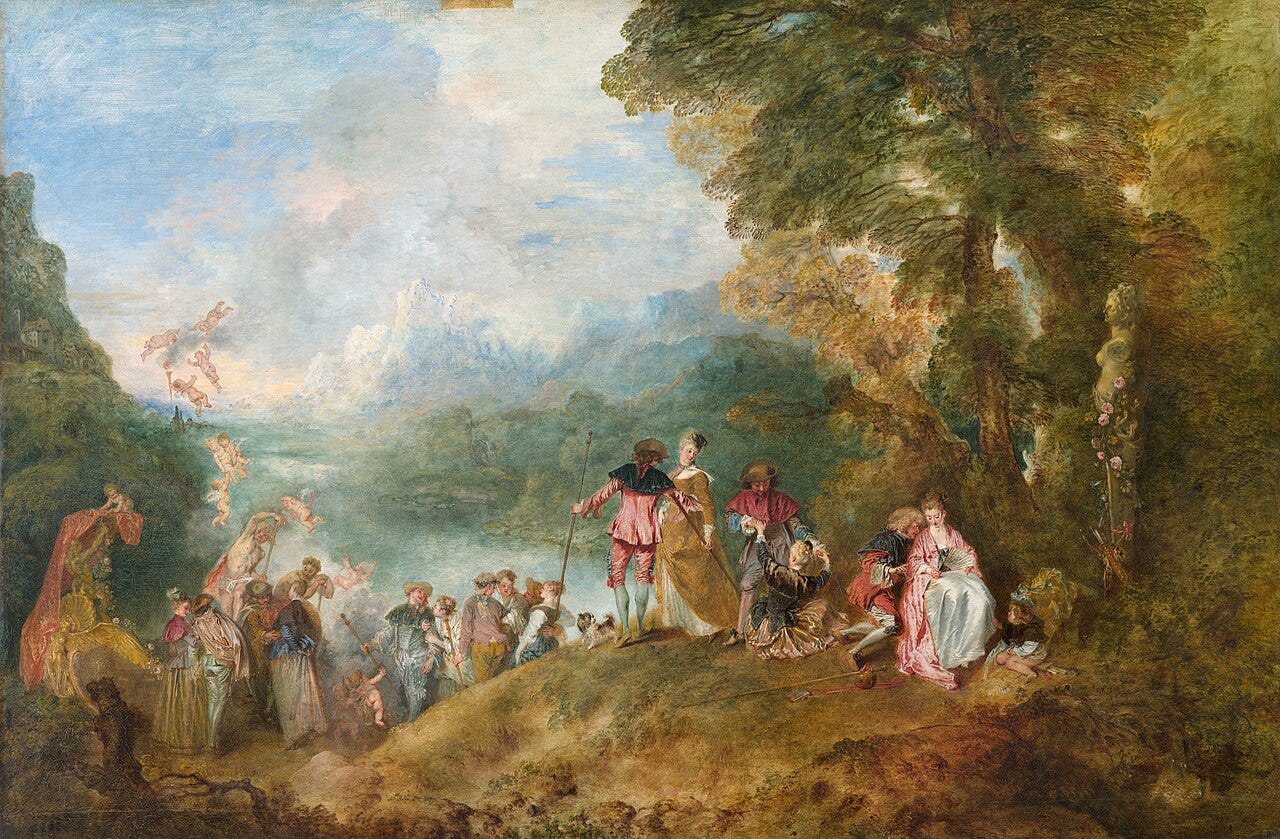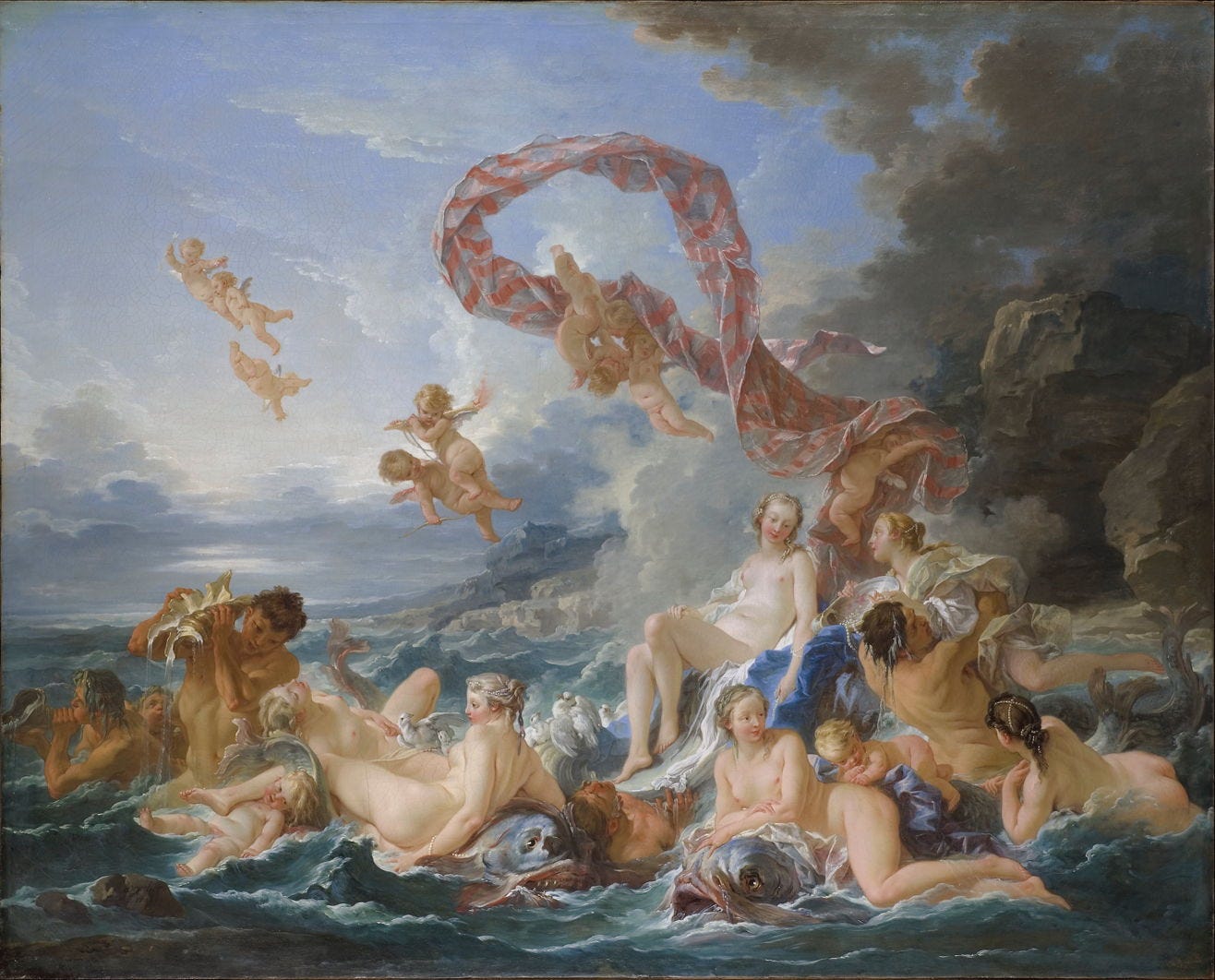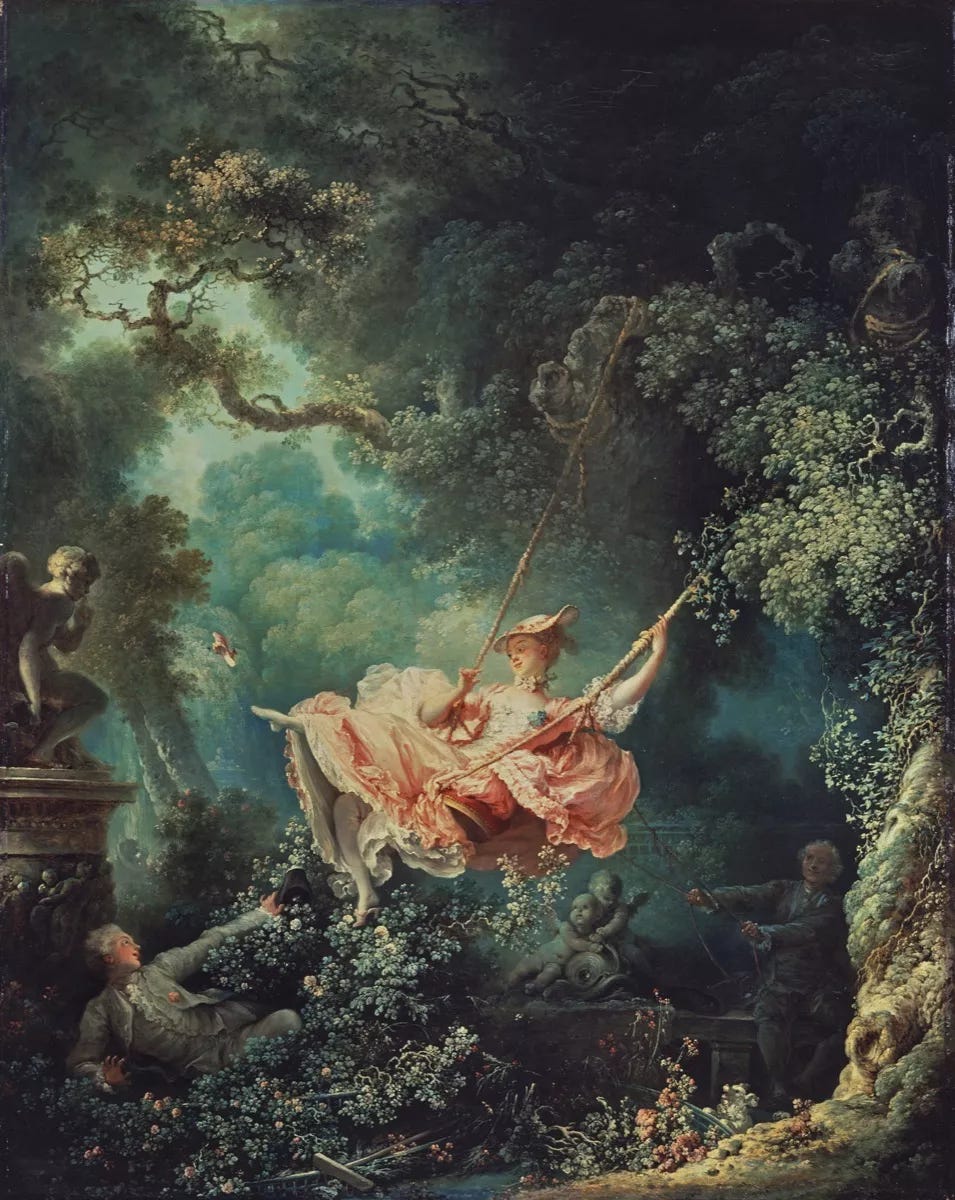French Rococo: A Lavish Odyssey of Escape
No matter our background or the era we inhabit, the longing to escape the everyday grind is a universal thread woven into the fabric of humanity. Whether through the pages of a beloved book, the allure of travel, or the embrace of art, we all instinctively seek refuge from the weight of our material surroundings and the complexities of our emotions. This quest for solace or a brief reprieve from reality, transcends time and culture, reminding us that, at our core, we all yearn for moments of liberation from our lives.
This desire for escape often manifests as an embarkation on a new adventure. It can take the form of diving into a cultural immersion, exploring new landscapes, or connecting with new traditions. Each of these experiences offers us a chance to step outside of familiarity, even if only for a moment, inviting us to discover new perspectives and, perhaps, new parts of ourselves.
A striking depiction of this quest is found in the work of the French Rococo painter Jean-Antoine Watteau (1684-1721), particularly in his celebrated painting, The Embarkation for Cythera. Characterized by a light color palette and flirtatious, playful subjects, Watteau’s style is a hallmark of the Rococo movement.
The Embarkation for Cythera transports us to a moment when French noblemen embark on a journey to the distant island of Cythera. Watteau masterfully captures not just the thrill of travel but also the emotional odyssey that accompanies this grand escape. He invites us to leave behind the mundane and enter a realm of bliss, where adventure and romance await.
The Embarkation for Cythera, Jean-Antoine Watteau (1717)
A Place of Mythological Importance
The island of Cythera holds significant mythological importance in ancient Greek culture, primarily as a sacred place associated with Aphrodite, the goddess of love and beauty. According to myth, Cythera was one of the locations where Aphrodite emerged from the sea, symbolizing her connection to love, desire, and beauty.
Cythera is often depicted as a paradise of romantic allure, making it a favored setting for tales of love and passion. The island serves as a backdrop for various legends, embodying the idea of an idyllic escape where one can find love and happiness. Its association with Aphrodite not only highlights the themes of romance but also the timeless pursuit of joy and connection.
In art and literature, Cythera represents a sanctuary where the everyday world fades away, allowing for the exploration of desire and emotion, reinforcing its status as a mythological haven for lovers.
The Triumph of Venus, Francois Boucher (1740)
Romanticizing Antiquity
The 18th century saw a resurgence of interest in classical antiquity, spurred by the Enlightenment. Artists looked on ancient myths as a source of inspiration, using them to explore the complexities of human experience. Many Rococo artists were commissioned by the aristocracy, who appreciated the sophistication of mythological subjects as a reflection of their own cultural refinement and social status. By idealizing Greek mythology, these painters crafted scenes that captured the essence of love, longing, and transformation, ultimately enriching the artistic landscape of their time.
A recurring theme among French Rococo painters is the idealization of Greek mythology, reflecting the ennui of noblemen at the French court. Bored with the constraints of court life, these aristocrats sought escape into the much more alluring world of antiquity, where myths abounded with beauty, romance, and adventure. The study of antiquity provided a captivating distraction, allowing 18th century aristocrats to immerse themselves in stories that transcended the mundane. The emphasis on beauty and elegance in Greek myths aligned perfectly with the Rococo aesthetic. Ancient stories, steeped in themes of love and human emotion, enabled artists to create works that were not only visually striking but also deeply resonant with an 18th century high society that valued charm and sentiment.
The Swing, Jean-Honoré Fragonard (1767)
In classical antiquity, nature was revered as a source of inspiration, embodying ideals of perfection and balance. This appreciation for the natural world seamlessly transitions into Rococo art, where nature serves as a vessel for nostalgia, offering a glimpse into a simpler, more enchanting time. Nature is idealized, serving as a captivating backdrop that contrasts sharply with the rigidity of 18th-century life. By celebrating lush landscapes and serene gardens, Rococo artists evoke a longing for the beauty and harmony that characterized both the ancient world and an idealized past, inviting viewers to escape into a realm where nature and nostalgia intertwine.
An Odd Blend of Old and New
Interestingly, the Embarkation for Cythera illustrates an odd contrast between the anticipation of new love and adventure, while simultaneously evoking a wistful nostalgia. Love is a central theme of the painting. The figures, captured in various stages of intimacy and connection, embody the complexity of romantic relationships. Some characters seem to exchange gentle gazes while others engage in playful flirtation. Watteau conveys the intoxicating nature of love. This depiction resonates with anyone who has experienced the exhilaration of new romance.
Close-Ups of The Embarkation to Cythera
Conversely, the artwork captures a deep nostalgia for the grandeur of antiquity, contrasting sharply with the rigid norms of 18th-century society and its shift toward a scientific approach. Amidst the Enlightenment’s questioning of traditional values, Watteau’s romantic vision offers a refuge, evoking a longing for a time when life was filled with beauty and meaning. The figures and setting reflect a yearning for a golden age of pure love and abundant adventures, striking a chord in a world increasingly constrained by convention and rationality.
In essence, The Embarkation for Cythera encapsulates the themes of escape, love, and nostalgia, reminding viewers that, regardless of time or place, the human spirit will always seek adventure. This serves as a reminder to remember, yet dream and embark on our own journeys.






Absolutely love this article!